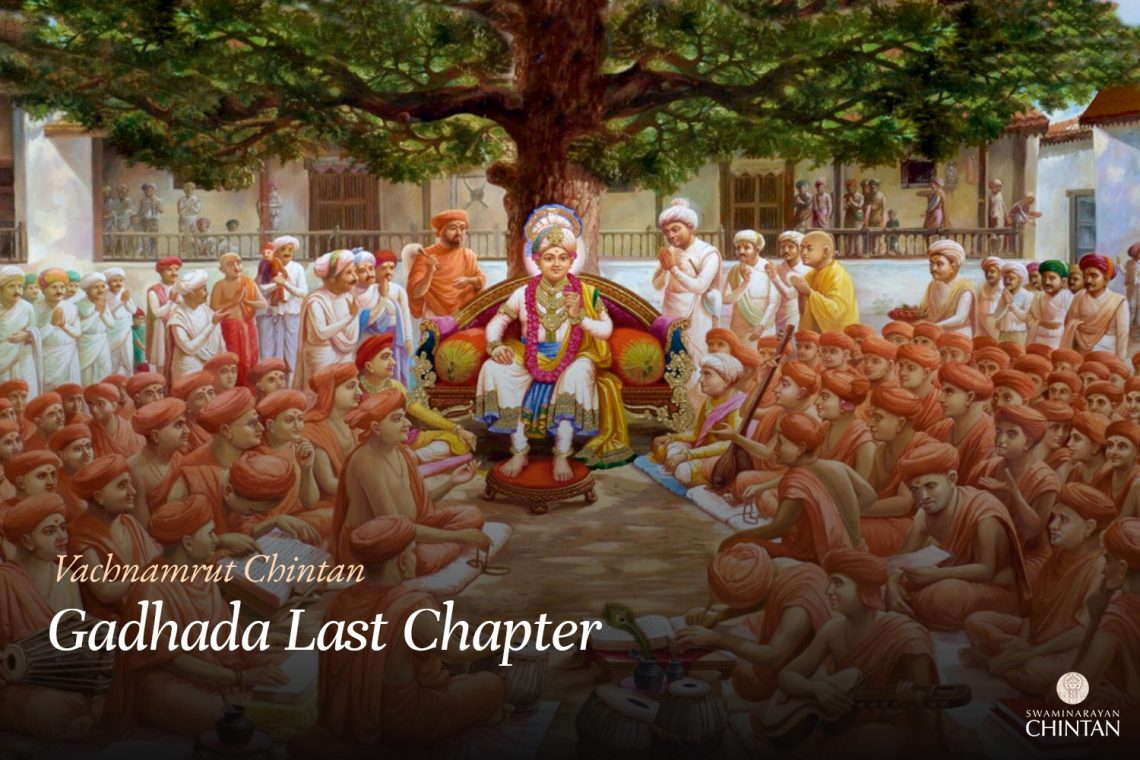Central Insights:
- Developing devotion for God through the principle of faithfulness.
Key Points:
- One must develop devotion for the svarup (form) of God that one has attained, with the single-minded dedication like a faithful wife.
- Devotion should not be akin to that of an adulteress.
Explanation:
This Vachanamrut is based on the principle of faithfulness. A faithful wife does not honor her husband merely because he is virtuous, wealthy, or powerful. Instead, her faithfulness lies in the steadfast adherence to her relationship. In our scriptures, many faithful wives were the spouses of asuras (demons), impoverished sages, or even unrighteous kings like Dhritarashtra. Yet, their faithfulness transcended all limitations. Marriage sanctifies the bond according to scriptural principles, making faithful wives resolute and glorious. Faithfulness does not operate with a lens of discretion. If one begins to discriminate based on virtues or character, the essence of faithfulness is lost. In this principle, the relationship itself becomes the foundation, leaving no room for discrimination.
Maharaj explains that a faithful wife does not admire the qualities of another man, no matter how wealthy, handsome, or youthful he may be, even if her husband is poor, unattractive, sickly, or elderly. If a faithful wife were to engage with another man emotionally or even laugh with him, her faithfulness would be destroyed. When guests or relatives visit, she offers them food and water as an extension of her husband’s honor, not out of personal affection. Her loyalty is rooted in her relationship with her husband. Similarly, one should develop devotion for God with the same single-minded faithfulness. If one allows affection for the virtues of others to influence their devotion, it will inevitably dilute their dedication to God.
In the scriptures, it is stated that devotees of God must consider an ekantik bhakt (a single-minded devotee) as akin to one’s in-laws, while God is akin to the husband. A faithful wife respects her husband’s parents even more than her husband, which is the proper conduct. Such respect even pleases the husband. However, this respect does not mean the parents surpass the husband in importance; the husband remains her ultimate focus. Similarly, for a devotee, God remains supreme, while ekantik bhakts are respected as His associates.
Another point arises regarding Maharaj’s teaching in this Vachanamrut: Maharaj instructs devotees to maintain faithfulness to the svarup (form) of God that they have realized. If one has been worshiping another avatar before joining the fellowship (satsang), and later comes to understand the supremacy of Maharaj and realizes His divine form, should they abandon the prior worship and focus solely on Maharaj? Would this still preserve the principle of faithfulness?
The solution lies in understanding that true faithfulness lies in recognizing the supreme form of God that has been revealed. The saints of Maharaj’s era, such as Sadguru Muktanand Swami, initially worshiped other forms of God with unwavering dedication. However, upon encountering Maharaj, they abandoned their previous forms of worship and dedicated themselves to Maharaj with absolute faithfulness. At times, the very avatars they worshiped directed them toward Maharaj. Hence, true realization of svarup can be seen as the ultimate attainment. The saints seamlessly upheld both faithfulness and discernment, recognizing Maharaj as the supreme form of God.
In conclusion, both faithfulness and discernment are vital principles. The great saints of the fellowship maintained both, demonstrating their importance. By adhering to this balanced approach, devotees remain aligned with Maharaj’s teachings.
Glossary
| Pativrata – Fidelity or devotion of a chaste wife Represents unwavering loyalty and faithfulness, used as an analogy for a devotee’s devotion to Bhagwan. |
| Svarup – Form of God |
| Ekantik Bhakt – Single-minded devotee |
| Faithfulness – Unwavering dedication |
| Discernment – Spiritual understanding |
| Satsang – Holy fellowship |
| Avatars – Incarnations of God Divine manifestations of Bhagwan in different forms to fulfill specific purposes. |
| Loyalty – Unwavering allegiance Resolute support for Bhagwan and His devotees, akin to one’s natural allegiance toward their own body. |

